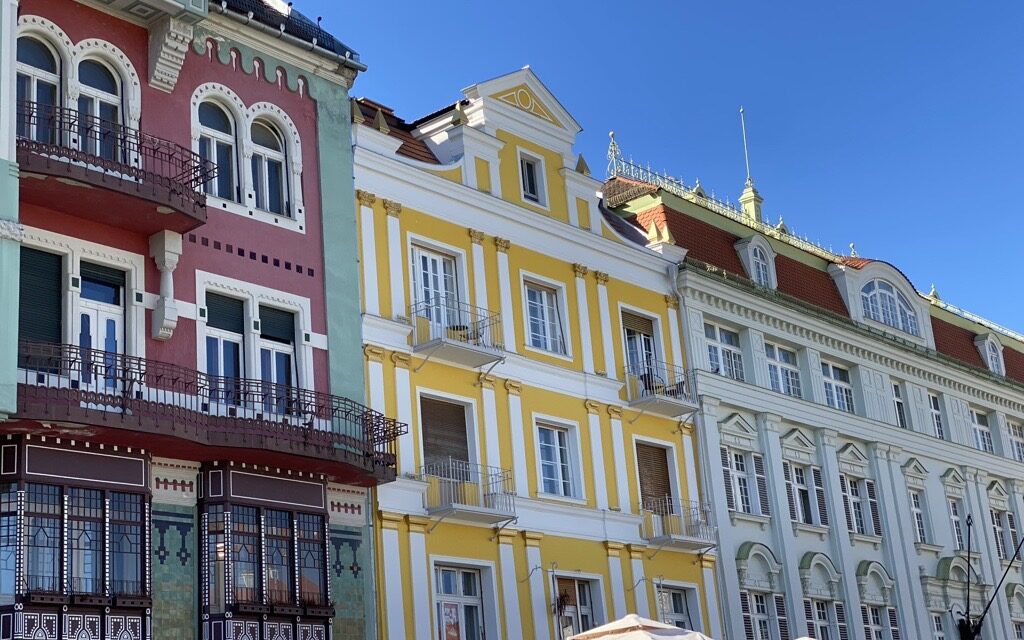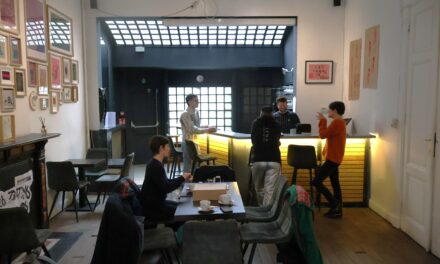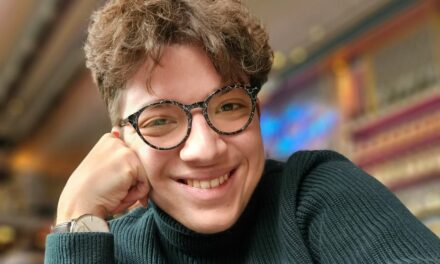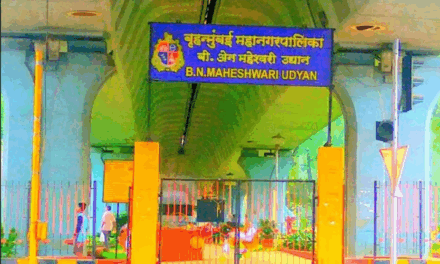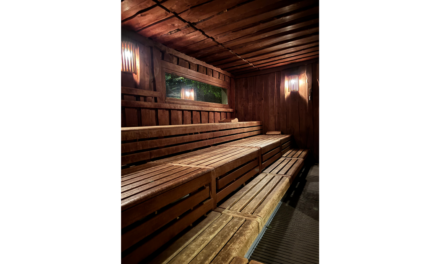As the new academic year approaches, I have been reflecting deeply on my first year in Luxembourg and comparing it with my experiences in other countries. One country that has really impacted me in this regard is Romania – my second home, with its incredible food, lovely people, and rich culture. Unfortunately, it is also a place where I cannot truly express myself. During my two-week visit this summer, I felt like I had to hide a part of who I am. It was a very disconcerting feeling after being open about my sexuality for seven years. That is why I have decided to use my voice to bring attention to the situation of LGBTQIA+ people in Romania, especially given the platform I have here. I will share my own experiences as a privileged visitor who only reconnects with his Romanian roots in the summer, and will also shed light on the challenges faced by people within the community and the stark differences compared to Luxembourg. This story will not be as light as my usual articles, but it is incredibly important to me, as I want to advocate for those who are unable to do so themselves. Thus, feel free to read at your own discretion.
My experience with the Romanian gay dating scene has been one of restraint and privilege, sheltered by my family’s background in the more developed cities in the west of the country. Obviously, the mentality in these areas is not as conservative as it is in the smaller villages and the East in general. Still, when I first tried using dating apps there, I felt completely out of place. Many profiles are anonymous, and finding someone who is openly gay is incredibly rare. I had forgotten to mention in my profile that I am Romanian, which led to daily messages from people warning me about guys wanting to engage in non-consensual and unprotected sex, and advising me to be cautious. I also received multiple propositions from men asking me to “take a walk and help them relieve stress”, most of whom were either married and older, or very young and inexperienced, both, though, offering money in exchange. There seemed to be no in-between.
On top of this, the usual discrimination I face for being in a wheelchair made connecting with others in the community impossible, which was deeply frustrating. Despite everything, I must admit that I feel more Romanian than German, and I would love to have a Romanian partner who shares the same cultural roots. However, I am constantly reminded of the realities: many potential partners are closeted, shy, and unlikely to come out because of societal pressures and fear of rejection. And honestly, I understand why. Even I am hesitant about coming out to my Romanian family; only a few know. While I guess that might be the norm for some, I am not used to that feeling anymore and it always creates inner conflict. Being asked about girlfriends even though I have had multiple boyfriends, enduring homophobic jokes and not being able to talk about everything I do outside of my studies, like writing these articles, is harder than I thought it would be. So, during my trip, I took a huge leap and came out to an older family member, but only because I was fairly sure they would react at least neutrally. Yes, that does indeed sound rather contradictory to what I just said, even I can feel this pressure, even if I only visit once a year. It pains me to admit that the personal struggles I faced this summer made me more aware of the larger systemic issues at play. Politically, the situation in Romania only exacerbates the difficulties for LGBTQIA+ individuals.
In fact, upon further investigation, it became clear that there is a stark absence of support for the LGBTQIA+ cause from major figures in Romania. This is particularly disheartening given that the country faces presidential elections later this year. Candidates from the three dominant political parties have all publicly expressed their opposition to the LGBTQIA+-cause. While the current Prime Minister Marcel Ciolacu, representing the ostensibly centre-left Social-Democratic Party (PSD), has insulted various groups within the nation on numerous occasions, the ex-Prime Minister Nicolae Ciucă, has stated that his party, the centre-right Liberal National Party (PNL), affirms its continuous support for the traditional family, for the faith in God and patriotism. In addition to that, there is a troubling level of dishonesty in this regard. As such, Elena Lasconi, candidate for the Save Romanian Union (USR), has radically changed her opinion in light of the upcoming elections, now claiming that her party supports inclusivity, despite having endorsed the notorious “traditional family referendum” in 2018 which opposed to constitutional changes that might have paved the way for legalizing same-sex marriage. Clearly, Romania lags behind its Central European neighbours in terms of progressivism. Same-sex marriage or a registered same-sex partnership (PACS) remain illegal, and society is still governed by traditionalists as well as religious values, fostering an insufferable environment for the people concerned.
To illustrate this environment first-hand, I was lucky to conduct anonymous interviews with members of the LGBTQIA+-community who face these challenges in their everyday lives. The insights I gained were both eye-opening and troubling. One non-binary person, Z., told me that “being a boy just felt right”, even though he was assigned female at birth (AFAB). He began dressing in a more masculine way, which led to discussions with his parents, who insisted that, since Z. does not have any “boy parts”, he should not behave that way. Moreover, Z is also attracted to girls and is dating another AFAB person, a relationship he must hide from his parents. “Lying just becomes easy for me. Still, just about every day, I worry and think about what happens if my mom somehow finds out. I will never be their son, and I know I will probably be disowned […], so the idea of having a job and a way to support myself financially in the future is always at the forefront of my mind.” In Z’s view, Romania still suffers the consequences of its communist past, as the ideology is ingrained in the beliefs of the older generation. Given that many young people leave the country, the population is predominantly composed of individuals aged 30 and older, which is reflected in the political landscape. All of this contributes to the loss of the national identity among the new generation, leading to slower societal changes. Therefore, if you plan on visiting, public displays of affection should be kept to a minimum and it is advisable to avoid smaller towns, staying in the bounds of the western cities and the capital for a safer experience.
Although I expected most of these responses, I was still taken aback by the normality with which I was given these answers. It made me see how fortunate I am to have a mother who, in spite of being Romanian, has always supported me. I am also so grateful to live in a country like Luxembourg where the LGBTQIA-community is not only accepted but actively supported. Having grown up in Germany, I have probably taken these privileges for granted. This is why I asked V., a university colleague who came from Romania last year and considers himself an ally, what he perceives as the differences between Luxembourg and Romania.
For him, the most significant difference lies in public acceptance. He was pleasantly surprised to see that Esch-sur-Alzette declared itself an LGBTQ Freedom Zone and that signs marking safe spaces for the community were visible throughout the city. “Something like that would never be possible in Romania without huge protests from the Church”, he remarked. V. also emphasised his appreciation for the absence of “punishment mechanisms”. It feels as though, no matter what you do, you are never in actual danger, unlike in Romania where there are actual predators who pretend to be interested on the apps, only to then beat people up. “A friend of a friend once found a partner on a dating app and decided to leave high school early to travel around the country with him for a year. The parents of that friend didn’t have an apparent problem with that until they encountered social pressure from other people in their town. When they were asked about their son, the parents fabricated about him going away with an older girl and relying on her for financial support, all while also dealing with snarky remarks about their son not finishing high school. The guy now lives together with his boyfriend and finished high school, but it just goes to show how brutal the social repercussions can be. “This is also why I chose to be anonymous; I don’t want my family back home to suffer from my declarations if this article finds its way into my community, because I know that only being an ally is bad enough.”
For all of these reasons, I have chosen to have the courage to stand up and lend my voice to a country and people that I love dearly, in the hope of provoking a change of mentality for at least one person. I have learned not to take my situation for granted and I hope that this story has given all of you an insight into a different world which, although it seems far away, is closer than you might think. I highly recommend visiting Romania and giving its culture, its food and its people a chance, for it is only then that real change can take place. All hope is not lost, and there is still time, so, take care of yourself as well as others and stand up for what you believe is right. To quote Z.: “It is never too late to be yourself.”
Foto: Alexander Raßbach

